Friday 1 April 2022 4:52pm
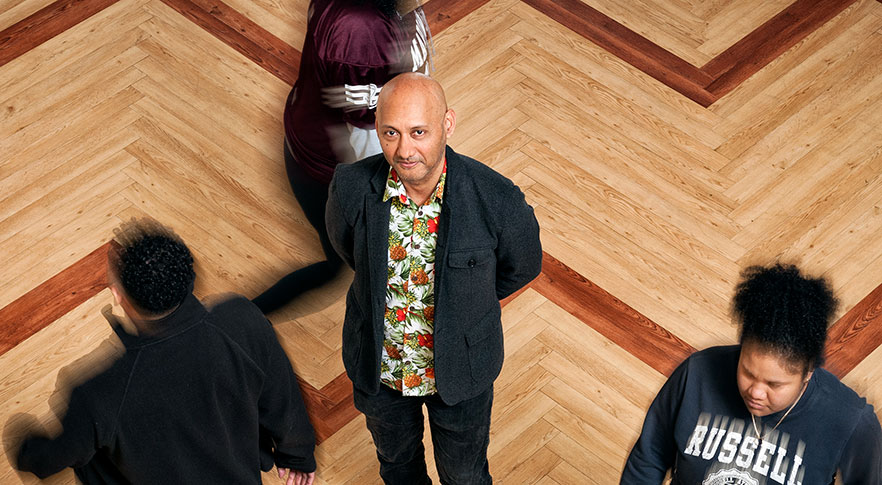
Associate Professor Patrick Vakaoti – a Fijian sociologist who proudly “lives [his] culture” – has been appointed Manutaki (Dean) of the University of Otago’s Te Tumu – School of Māori, Pacific and Indigenous Studies.
Associate Professor Vakaoti, who came to Otago in 2009, says the “personal and professional milestone” is underpinned by strong family, community and collegial support.
“In reflecting on my journey here, I must acknowledge those that have made it possible; my immediate and wider family, friends and colleagues. Na noqu mata vuvale, o ira na mata veiwekani kei ira na noqu i tokani. Becoming Manutaki/Dean is a humbling recognition of my service, teaching and scholarly contributions and achievements as a sociologist. I’m excited about the future possibilities with colleagues at Te Tumu and the wider University community.”
A commitment to strategic goals and pastoral care
In addition to teaching and research in the Sociology, Gender Studies and Criminology Programme, Associate Professor Vakaoti has made significant contributions to Otago’s strategic Pacific initiatives. These include serving as the inaugural Humanities Associate Dean Pacific until 2021, a member of the Pacific Leadership Group and the University’s Human Ethics Committee, and as co-director of the Otago Global Health Institute.
He also credits students as the source of “many learning moments”, leading to a wider appreciation of the complexities of how Otago operates and how it must “focus on providing research-based teaching that meets student needs”.
Along with Māori and Pacific staff growth, a priority as Dean will be building on Te Tumu’s relationships within the University and exploring potential partnerships with other disciplines and programmes.
“I would like to consolidate Te Tumu’s reputation of teaching and research excellence within a broad vision of the School as a place of scholarly and intellectual hope. I envision Te Tumu as a central location for prioritising, and realising, the University’s Te Tiriti o Waitangi obligations, where Māori and Pacific teaching pedagogies are centred, and research relevant to Māori and Pacific communities are prioritised.”
“I also come with my indigeneity. As a Fijian, I am a manuhiri on this land. This identity status guides my interaction with mana whenua and tangata whenua. From a Fijian perspective, relationships or vei wekani are key to any interaction, whether with students or staff. These and other cultural values like listening or vei rogorogoci and care or vei kauwaitaki will help me navigate and perform the role.”
He acknowledges matching aspirational goals with strategic realities may be a challenge but says Te Tumu is ideally situated to become a natural place – both for Māori and Pacific students and staff and the wider University community – for imbuing a consciousness of mātauranga Māori and Indigenous ways of knowing.
“Universities act as the critic and conscience of society – Te Tumu, with other stakeholders, can be that for the University. Otago has expressed aspirations to be a University ‘in and of’ the Pacific. This is both noble and contentious and a conversation that should be considered within the existing cultural, alumni and institutional relationships Otago has with the Pacific and its people. Te Tumu has a significant role in navigating this aspiration.”
Te Kete Aronui Humanities Pro-Vice-Chancellor Te Manukura Professor Jessica Palmer says Associate Professor Vakaoti’s dedication to Moana Pacific has been seen clearly in his service as Associate Dean Pacific and his other roles at Otago.
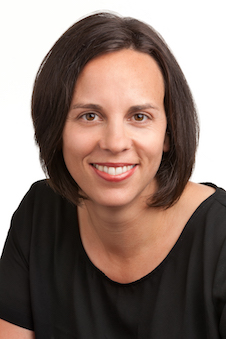
Division of Humanities PVC Professor Jessica Palmer
“Patrick’s research as an Indigenous Pacific sociologist and his commitment to serve Māori and Pacific peoples positions him to be a strong academic leader at Otago. Patrick provides invaluable guidance to successive students, academics and professional staff to improve outcomes across the board. I am really looking forward to seeing Patrick apply his considerable organisational and leadership skills in Te Tumu to assist it to continue its strong relationships with Māori and Pacific communities in Aotearoa and beyond.
“Te Tumu’s talented staff and Māori and Pacific leaders University-wide have worked carefully and faithfully over many years to build a community of active researchers in Māori, Pacific and Indigenous studies, exploring a diverse range of issues. They have also been vital to encouraging increasing numbers of Māori and Pacific students to Otago and have provided a welcoming and supportive place for rangatahi to flourish.”
Professor Palmer says Associate Professor Vakaoti’s appointment is an important part of Te Kete Aronui’s commitment to the Māori and Pacific Strategic Frameworks and will provide leadership across the Division in celebrating and advancing Māori and Pacific success.
A background in Pacific research
Associate Professor Vakaoti has paternal links to Malawai, Gau, Lomaiviti and maternal links to Ucunivanua, Verata, Tailevu in Fiji. He is married to Dr Vanisha Mishra-Vakaoti and they have a young son, Rafa Mishra-Vakaoti. Associate Professor Vakaoti was born in Levuka, Ovalau, educated at Marist Convent School and Saint John’s College and later completed undergraduate and master’s studies at the University of the South Pacific. He gained a PhD from the University of Queensland for his thesis on street-frequenting young people in Fiji.
This led to work as principal research consultant on UNICEF’s East Asia and Pacific Office Reliable Information Database Project, with the organisation Knowing Children in Bangkok, Thailand, and as the national researcher on the UNICEF – Fiji Government Baseline Research on Child Protection project in Fiji.
He has also worked as the Pacific Islands Research Fellow with the State, Society and Governance in Melanesia (SSGM) Programme at the Australian National University (ANU).
At Otago, his research initially focused on the experiences of street-frequenting youth, their time on the streets, their networks of friends, their relationship with the law ‒ and the risks they faced from sexual assault and drugs and alcohol. In recent years he has also examined young people’s political participation ‒ including in the last two Fijian elections ‒ and the identity formation of young people in a fast-changing global environment.
“My initial interest in young people was sparked by the existence of those in the margins. In a society characterised by inequalities, the people who lose out are those who don’t have access to economic, cultural, social or political resources. My research attempted to shine a light on young people as a category and understand who they are and the issues they face. This is very important because, globally and locally, they are a force to be reckoned with.”
His research interests have broadened in recent years to include Indigenous community development, research ethics and social protection.
Associate Professor Vakaoti co-directs Otago’s Global Health Institute with Professor Phillip Hill (Department of Preventative and Social Medicine). With Mercy Hospital, the Institute supports the Fiji National University’s new Centre for Communicable Diseases positioning itself as an internationally competitive research centre in the Pacific. The Institute’s vision is to give people in regions most affected by health problems the facilities and expertise to solve them.
Associate Professor Vakaoti will commence as Manutaki (Dean) of Te Tumu – School of Māori, Pacific and Indigenous Studies in January 2023.
Pacific and Indigenous leaders applaud appointment
Pacific and Indigenous leaders say Associate Professor Vakaoti’s appointment will create many opportunities for community engagement and further research and teaching initiatives.
Dr Tasileta Teevale MNZM, Director Pacific Development
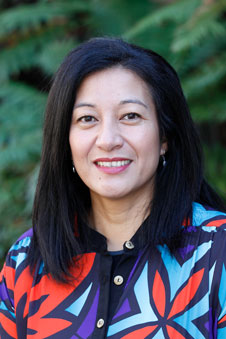
Dr Teevale
Associate Professor Patrick Vakaoti brings a wealth of experience as a scholar of the great Moana-nui-a-Kiwa, having spent his scholarly career in this South Pacific region and Aotearoa specifically.
He has a proven record of actively contributing to our University’s Pacific Strategic Framework goals, having been appointed as the inaugural Associate Dean Pacific in the Humanities Division. With his strong bi-cultural background, he will add value to the aspirations of Te Tumu into the future, bringing his inclusive leadership and understanding of the strong connections between the peoples of Aotearoa – tangata whenua and the Pacific and to Indigenous peoples around the world. I know that the scholarship in Te Tumu will thrive under his guidance as the new Dean.
Peni Qauqau, Dunedin Fijian Community Chairperson
This is great news for the Otago Fijian community. It’s been great to see Patrick’s rise through various positions at the University. Personally, and speaking for our local Fijian community, we are very proud of him and his achievements. I’m also thrilled for his family and extended family, both here and in Fiji.
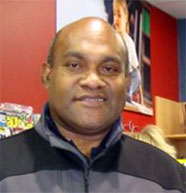
Peni Qauqau
He’s breaking new ground for a Fijian and, in a broader sense, for a Pacific community member because, while there are leading and emerging academics and scholars nationally working in areas like Health Sciences or other disciplines at Otago, it’s very pleasing to see this appointment in the Humanities field.
In his work, Patrick has encouraged students to come and do research. Fijian students look to him as a role model; someone who was born in Fiji and has come here and had a rewarding career and made a real contribution. I hope that encourages students and adds impetus to efforts to recruit our young people to study at Otago.
Patrick’s wider research also addresses issues that may be appealing to younger staff or students. These are very relevant and important to Pacific youth, whether they’ve grown up in the region or in Aotearoa.
Tofilau Nina Kirifi-Alai, Pacific Community Engagement Manager and former Pacific Island Centre Manager
I was emotional when I heard the news of Patrick’s appointment, and the first thing that came to mind was that he is the perfect gentleman to take the role. He engaged with the Pacific Island Centre from the time he and his family arrived in Dunedin, and we built a great rapport. He really became part and parcel of all the Centre’s programmes, giving his time and expertise at events and with academic and support programmes.
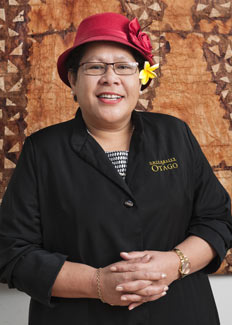
Tofilau Nina Kirifi-Alai
He was also a longstanding editor for the Pacific Voices Programme and was a Pacific leader invited to assist the Centre when it established the FOFOA flats for Pacific students in 2015. He showed a strong sense of leadership and was well respected by everyone due to his genuine belief in providing a good experience for Pacific students. Many of our students are away from their homes and cultural warmth for the first time. Patrick, and many others, have shown great integrity to actually follow through and provide support in an authentic, genuine way. As well as being student-focused, he cares about Indigenous issues. So many times, we benefited from him offering an academic point of view to help contextualise a subject in a very nice, quiet, but strong way without ever leaving his culture. His whole approach shows that when you live your culture, you will be a good leader no matter what you do. Otago’s relationship with Island nations, and Pacific people in the whole region, is strong because we are genuine in our approach, and Patrick will continue this work – I’m very excited for the future.
Sailosi Pole, Chairman, Pacific Trust Otago
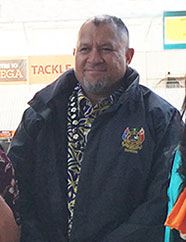
Sailosi Pole
I am delighted and had a great feeling of pleasure to learn of this significant achievement by one of our own, tangata moana (Pasifika) Associate Professor Patrick Vakaoti.
While the Pacific Trust Otago already has connections with the University of Otago, this appointment will undoubtedly create new opportunities to improve our engagement on many levels. I look forward to celebrating this appointment with Associate Professor Vakaoti and University community in future.
Professor Poia Rewi, Te Tumu Dean from 2015 to 2020
Associate Professor Vakaoti will bring a lifetime of experience as a lived practitioner of Pacific and Indigenous peoples, which, coupled with his teaching, research and leadership in the tertiary environment can only add to the solid foundation Te Tumu has established over the years.
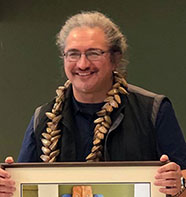
Professor Poia Rewi
The Division of Humanities and the wider University of Otago will be reassured that Indigenous voices, practice and leadership and development will continue to be heard and experienced through Te Tumu, its staff and students. With the appointment of Dr Vakaoti at the helm navigating new moorings upon which to tether the bright futures of Māori, Pacific, Indigenous and wider communities. Taking the words of a past Te Tumu staff member, “He huruhuru te manu, ka rere; he taki te kāhui, ka tau”, resourcing provides the means, leadership allocates those resources accordingly to effect the desired success.
Professor Michelle Thompson-Fawcett (Te Iho Whenua, School of Geography) Division of Humanities Associate Dean Māori
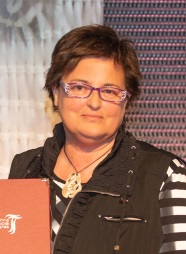
Professor Thompson-Fawcett
I’m very excited about Patrick taking up the role of Dean of Te Tumu. Patrick is an inspirational and visionary thinker who connects aspirations with action. He sees the potential of the intellectually stimulating space that Te Tumu offers the wider University – a place of hope where we can cultivate conversations about implementing bold plans for flourishing as a university in and of the Pacific.
Patrick also understands well the embedded nature of ‘service’ for Indigenous academics in universities. There’s a real possibility of flipping our university’s understanding of what service looks like in the Indigenous context – and acknowledging that in our progression and promotion processes. Patrick’s humble manner dovetailed with his quietly persuasive commitment to transformation will be hugely valuable for Te Tumu and the University.
About Te Tumu
Te Tumu is a progressive School that has offered a major in Māori Studies since 1990. Over the last decade, the School has expanded its curriculum to include majors in Pacific Islands Studies and He Kura Matanui/Indigenous Development and a Master of Indigenous Studies (MIndS) degree (by coursework or thesis). Te Tumu seeks to “provide a culturally and academically positive environment that enables staff and students to reach their full potential in research, teaching and learning, and administrative activities.”
